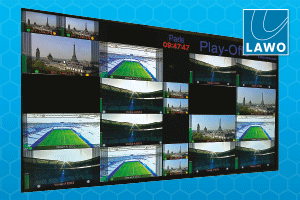Dubai-based producer Kaveh Farnams co-production with Iranian director Mohammad Rasoulof was recently given the main award in the Cannes Film Festivals ‘Un Certain Regard’ category. In an exclusive interview with the filmmakers, BroadcastPro ME finds out what made Lerd a winning entry Acclaimed Iranian director Mohammad Rasoulofs film Lerd (A Man of Integrity) has won […]

Dubai-based producer Kaveh Farnams co-production with Iranian
director Mohammad Rasoulof was recently given the main award in the Cannes Film Festivals ‘Un Certain Regard’ category. In an exclusive interview with the filmmakers, BroadcastPro ME finds out what made Lerd a winning entry
Acclaimed Iranian director Mohammad Rasoulofs film Lerd (A Man of Integrity) has won accolades at several international film festivals. The Farsi-language film received the main prize in the ‘Un Certain Regard’ category at the prestigious Cannes Film Festival, beating 17 other international titles. The film was also awarded the Fipresci Jury Prize at the 14th Yerevan International Film Festival and it enjoyed a very positive reception at the 52nd KVIFF (Karlovy Vary International Film Festival) held last month in Karlovy Vary in the Czech Republic.
Lerd is Rasoulofs second film to be screened at Cannes. It was produced by Dubai-based filmmaker Kaveh Farnam, CEO of Advance Media, a distributor of broadcast products.
The films title refers to the sediment that settles or collects on a surface by a natural process. Its the worthless residue that collates and sinks to the bottom of beverages such as coffee. According to Farnam, who also worked on the script along with Rasoulof: Lerd has the spirit of a Rasoulof film. Dregs of society usually refers to people you consider to be immoral and of no value.
The English title of the film is A Man of Integrity.
Rasoulof is often called Irans most outspoken filmmaker. Farnam describes him as an artist with a good knowledge of the courage society displays in criticising power. The director tackles issues such as poverty, corruption, censorship, murder and organised crime, with flair.
As with all of his films, A Man of Integrity has a deep look at society. Rasoulof is not only telling a story about people and relationships through this film, but he also analyses and criticises society. The focus of this analysis is a centralised power structure, says Farnam.
Lerd is set in rural Iran. The 117-minute feature film, Rasoulofs sixth, centres on a politically liberal goldfish farmer battling corporate oppression in northern Iran. More than 95% of the film was shot in Gilan in the northern territories of Iran, with the rest shot in Tehran.
Shot on an ALEXA Mini with Angénieux zoom lens, the film has a naturalistic look like Rasoulofs other films, and the focus is more on the drama. The cinematography captures the natural world around the goldfish farm where the story is set, and the real locations add to the dramatic element in the film. The surroundings are as much a part of the story as its lead characters, played by Reza Akhlaghirad and Soudabeh Beizaee.
Farnam reveals that the film was originally meant to be shot on the new RED 8K but there was a delay in its launch. He adds that the ALEXA Mini was good enough for a 4:4:4 picture, which the film required. Proxy editing was done using Final Cut Pro, and the editors used DaVinci Resolve for grading.
The idea was to realise the directors vision, and these tools worked well to achieve the look we wanted. It was a team effort, with more than a hundred technical and creative crew involved in the project, led by Rasoulofs creative vision, Farnam points out.
The story revolves around the life of an educated young couple. Having distanced himself from the complexity of urban living, Akhlaghirad leads a simple life along with his wife and only child, in a remote village in Gilan. He spends his days working in his fish farm. However, a private company with close links to the government and local authorities has taken control of nearly every aspect of life in that region. Its powerful and wealthy shareholders have been pushing local farmers and small business to let go of their belongings, farms and estates, for the company to establish a monopoly. It is under their pressure that many villagers have themselves become local ringleaders.
The protagonist resists the companys power to preserve his farm, but soon realises that he is too small an entity to fight the deeply ingrained corruption. The film is a moving account of his frustration at being trapped in a complex web of bullying and malice.
For Farnam, working with Rasoulof was a dream come true, as he has always admired the directors style and commitment to society.
I can say Im in love with all of his films. I was at the first screening of Manuscripts Dont Burn at Cannes 2013. At the end of the screening I went to him and extended my appreciation for his courage and of course, his fantastic movies. It was in that meeting that I proposed a possible joint venture. I was fortunate enough to have this opportunity with Lerd.
This collaboration with Rasoulof was not just about Farnams passion for films but also the experience, which he will cherish for a lifetime.
Farnam says: Normally the stories which interest me relate to the society and people around me. I was fortunate to work with such a wonderful person as Rasoulof. I have learnt a lot from him not only about films, but also about humanity. Although this was not my first co-production, I can say it was probably the best professional experience of my career.
Rasoulof is a regular at Cannes. His 2013 film Manuscripts Dont Burn (Dast-Neveshteha Nemisoozand) was screened at the 66th Cannes Film Festival. The story is inspired by real events, which Rasoulof has yet to clarify, but they seem likely to be the so-called Chain Murders of more than 80 Iranian writers, intellectuals, political activists and ordinary citizens between 1988 and 1998, all critical of the Islamic Republic.
Speaking about his films, Rasalouf says: My characters are based on those around me.
In my mind, I can find references to the events and characters in this film too. I am only looking around me. I tell my stories and within them ask my questions. Many are questions that have remained with me since my childhood. For example, when our history books in school told us that, from hundreds of years ago, kings have ruled people by subjecting them to oppression and injustice, I used to ask myself, how is this possible? I think that I am still asking the same questions.
















































































